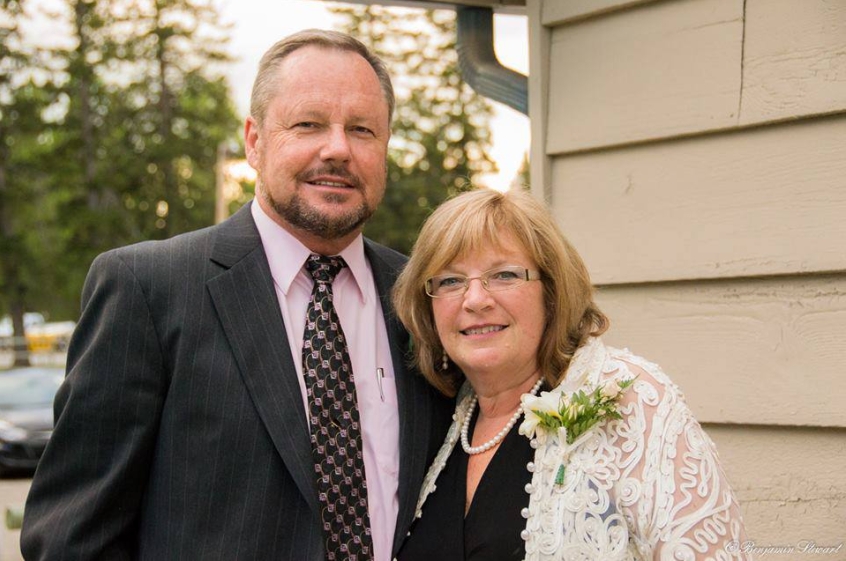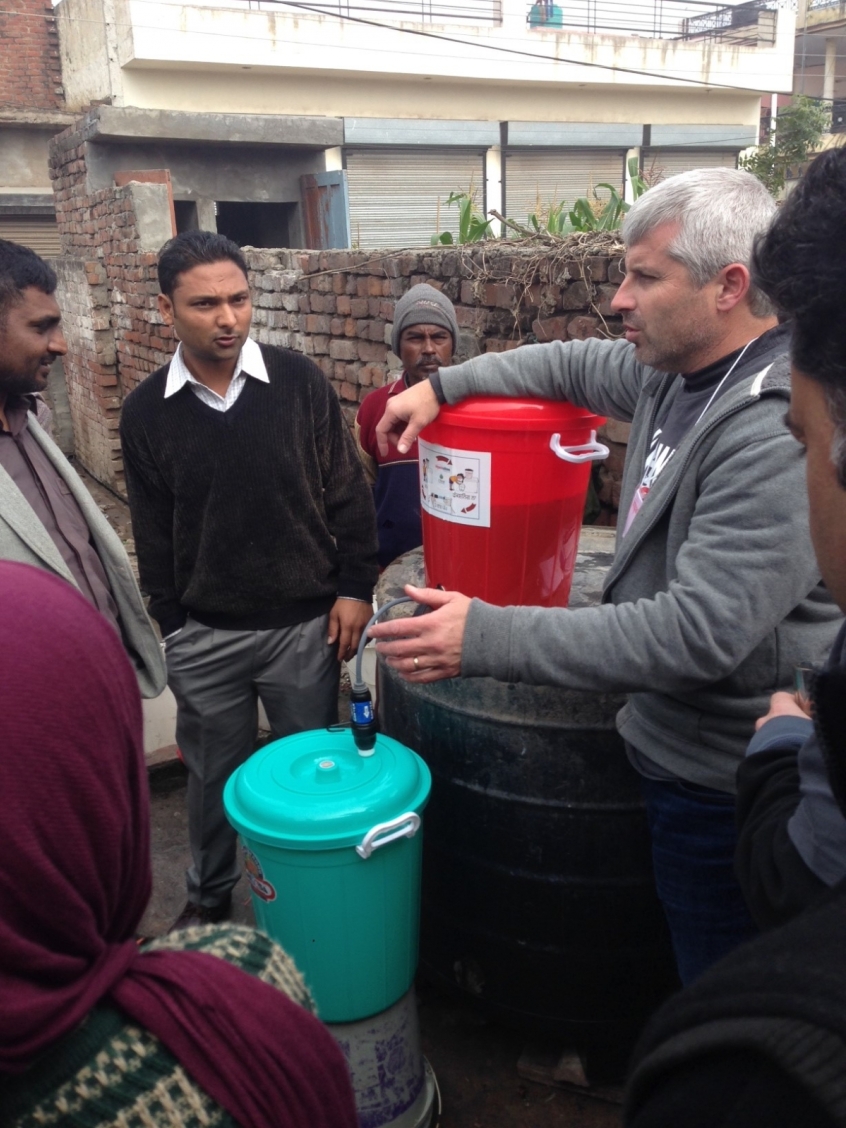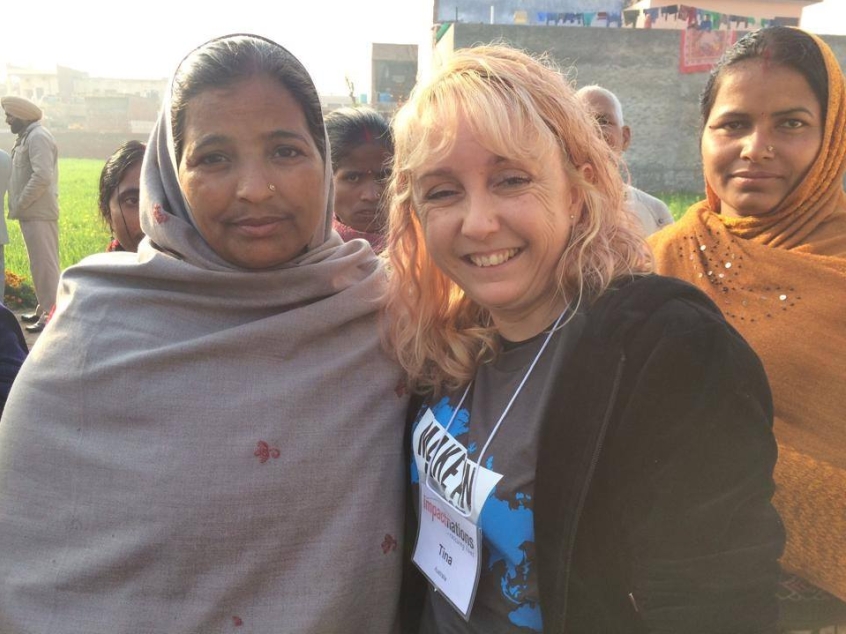Steve Stewart is the founder of Impact Nations, an international ministry passionate about sharing the Gospel and healing power of Jesus among the poorest communities around the world.
His heart is to see the Kingdom of God advance, both through supernatural intervention and the practical support of Christians. He believes that we are all called to be active in God's plan for redemption, and that the western Church must learn from the faith movement gaining momentum in countries such as India, where house churches are growing in spite of intense persecution in some areas.

"There is a certain irony that although we in the West pursue vicarious adventure through entertainment, we are reluctant to speak in large terms. Although we in the church should be the most vocal in calling people up to a great purpose, the great adventure of living in the Kingdom of God, we settle for small things in this present age," Steve writes in his book, 'When everything changes'.
"We put our desires and hopes off into the Age to Come. With over half the world suffering in extreme poverty, with more slaves living now than at any time in history, there has never been a greater need for men and women to rise up and activate their faith.
"This is a joyful, exuberant call to action," he says.
Christian Today got the opportunity to catch up with Steve, and learn more of his desire to see people capture God's vision to see people lifted out of hopelessness and desperation across the globe.
CT: One of your passions is to see people become active in God's redemptive plan. Why is it so important?
SS: Romans 8:19-22 tells us that all of creation is groaning, waiting for the sons - and daughters - of God to be revealed. We are called to participate in the rescue, reconciliation and restoration activity of God's Kingdom. This is what we were made for. The Kingdom is in our DNA and when we start to move in its rhythm, we come alive. It amazes me that the Creator of everything invites us to partner with Him in His great purpose.
CT: How can the Church be released to become less passive?
SS: Jesus has always invited and challenged men and women to a lifestyle of active faith. To follow Him (Matthew 4:19-20) means movement from something to something. Discipleship is never static. As Jesus said in John 12:26: if we want to be His disciples, then we must follow Him, and if we are going to follow Him, then we must be where He is. One of the key ways that Jesus forms us is through the movement of following Him into new situations. At the end of the Sermon on the Mount, Jesus says that the only difference between the one who builds his life on the rock and the one who builds on the sand is putting Jesus' words into practice. Moving from theoretical belief to active participation is one of the greatest dividing lines in the 21<sup>st century church.
CT: You talk about the idea of 'Vukani' a lot – can you expand on what you mean by that?
SS: Vukani is a Zulu word that means "get up and do something". As Shane Claiborne has said, the best way to start is simply to find out what God is doing and then join in. This is really practical advice. Look for ways to get involved in your community with what God is doing –– mercy ministry to the poor, bringing justice to the weak, praying for the sick in your neighbourhood. One great guideline is found in Matthew 25:31-40: Minister to Jesus by taking food or clothing to the homeless, inviting a stranger to your home, visiting prisoners at a local jail or prison. Remember, we were made for this kind of Kingdom activity.

CT: You've done lots of ministry in India, and have spoken of your belief that the western Church could learn from the movement there. How?
SS: I just returned from my seventeenth trip to India. This time I took a team of 30 from four Western nations into northern India. Once again, I was impacted by the level of faith and commitment to Christ that I saw demonstrated in the lives of the Indian believers. We were working with a house church planting movement that is growing at a remarkable rate. Thousands are being baptised every day.
As a result, the church is filled with new believers whose faith is demonstrated daily in their lifestyle. They continually share Christ with those around them and pray for the sick out in their communities, this is reflected in their continuous stream of miraculous testimonies. They live with both a contentment and trust for their material needs to be met daily, and they share what they have with one another. Consistently, I have observed two predominant characteristics among the Indian believers: joy and faith. On more than one occasion I woke to the sound of their worship in the morning and fell asleep to the same sound at night. Prayer seemed to be spontaneous, certainly there was no great effort needed to get them to gather to pray. Our western team went home greatly impacted by seeing the life of the early church described in Acts lived out among the Indian believers.
CT: Do you have any stories in particular you'd like to share from your last trip?
SS: During this trip to the Punjab, we saw many hundreds of healings and over 1,000 people gave their lives to Christ - and gave their contact information. Our partners are now in the process of meeting with all of them and establishing over 20 new house churches. During this journey of compassion blind eyes and deaf ears opened, cripples got up and walked. A woman who had been paralysed for a long time because of a stroke was carried to our medical clinic and after prayer, she was totally healed and walked out. As word of this went around the community, we were surrounded by men and women desperate for healing prayer. In every case, after they were healed, we told them about the Healer, and every one opened their lives to Christ. Here is one of the reports I wrote during the journey:
"I have been to India 17 times, and we are now seeing something that I have never witnessed before. Instead of suspicion or hesitation, the Gospel is being embraced by almost everyone. I say almost, because there must have been some people who did not come forward to give their lives to Jesus, but I couldn't see any of them. Once again, every hand went up. There was a huge crush of people who immediately came forward at the invitation. The crowd at the front was so dense that many of the impact team had to go to the back in order to have room to pray for people. And once again, healing after healing took place. Some members reported 100 per cent healing. One of the things that has impacted me greatly the past two days is the eagerness with which the Sikh gentlemen respond.
There were so many healings throughout the day - both during the medical clinic and at the evening outdoor meeting - that I will only mention a few highlights. Merve, who is heading up the medical team for this journey, had an older woman come. She couldn't hear, so Merve looked at her ears with his scope. Both of her eardrums were 'atrophied', they were opaque and shrivelled. Merve prayed for her and suddenly she could hear perfectly. He decided to look in her ears again with the scope. Merve was amazed to see two soft, translucent eardrums that he told me were like those of a baby. Later a man with severe cataracts came to him. After prayer, the man could see perfectly. Merve looked at his eyes with his instrument and the cataracts had completely disappeared.
Tina prayed for a woman who received healing then gave her life to Jesus. A few minutes later she came back with six more women. Tina prayed for each one of them in turn, each one was healed and each one asked Jesus into her life.
Once again we are reminded that the cornerstone of the Gospel is to demonstrate the love of God, both practically and supernaturally. Follow-up has already begun with Randeep's team. They have identified 'houses of peace' (Luke 10:6) where new house churches will be started right away."

CT: What is the most important thing Christians can do to bring hope to non-believers?
SS: Although these stories may seem more dramatic than what many of us experience at home, they reveal some universal principles. The most important thing we can do to bring hope to not-yet-believers is to love them. The Kingdom of God operates with power and authority, but its foundation - its motivation - is compassion. Jesus was moved with compassion. Let me repeat what I wrote in the report from India: The cornerstone of the Gospel is to demonstrate the love of God. There has been enough (too much?) talk, it is time to show people the love of Christ. We can do this by following Jesus' example of serving people (Mark 10:45) in practical ways. We can also learn to step out of our comfort zone and simply ask the question, "May I pray for you?" In this word-saturated world, people will not remember what they hear about the love of God, they will always remember what they see demonstrated of the love of God.
CT: You mention: "When we do the works of the Kingdom, we are stepping into conflict. .How can stepping outside of our comfort zone release us to see God's bigger vision? What's the importance of risk?
SS: John Wimber used to say that faith is spelt R-I-S-K. After years of personal experience and of taking hundreds and hundreds of people out to the front-lines of ministry, I have become convinced that we only grow in effectiveness in the activity of the Kingdom to the degree that we are willing to take risks - no exceptions. If we want to see God move through us and around us, we must step out of our comfort zone and take risks. Without this, we will never truly be in a place of dependence upon the Lord. Like pounds in the UK and dollars in America, faith is the currency of the Kingdom.
'When everything changes: Healing, Justice and the Kingdom of God' (2012) is published by Fresh Wind Press.













